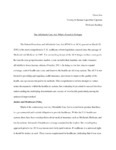What's Passed is Prologue: The Affordable Care Act

View/
Author
Lee, Grace Mee-Jeung
Subject
Washington and Lee University, Shepherd Poverty Program
Capabilities approach (Social sciences)
Health insurance -- Government policy
Health care reform
Social justice
Medicaid -- Law and legislation
Public health
Community health services
Primary health care -- Quality control
Metadata
Show full item recordDescription
Grace Mee-Jeung Lee is a member of the Class of 2015 of Washington and Lee University. Capstone; [FULL-TEXT FREELY AVAILABLE ONLINE] The Patient Protection and Affordable Care Act (PPACA or ACA), passed on March 23, 2010, is the most comprehensive U.S. healthcare reform legislature enacted since the passage of Medicaid and Medicare in 1965. The overarching design of the ACA hinges on three main goals: Reform the non-group insurance market, create an individual mandate, and make insurance affordable to lower income citizens (Grueber, 2011). In doing so, the law aims to expand coverage, control health care costs, and improve the health care delivery system. The ACA is not limited to providing and requiring health insurance; provisions to improve the quality of the health care system are integral to its methods. This comprehensive reform attempts to reduce many discrepancies within the healthcare system, but evaluating its potential to succeed involves understanding the underlying determinants and caveats of poor health, particularly among the uninsured impoverished. [From initial section] Grace Lee